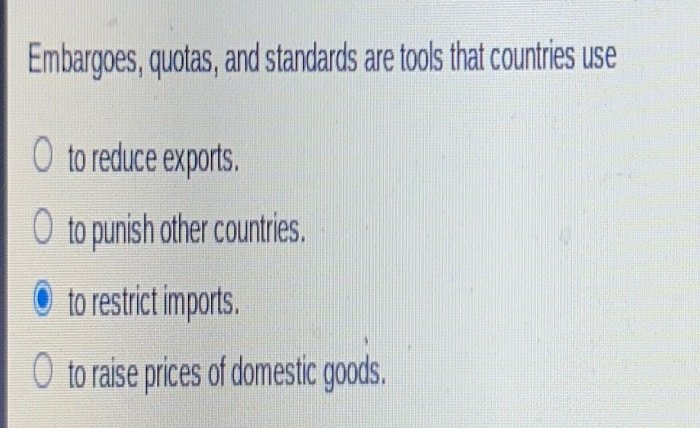
Introduction:
Trade policies are crucial for shaping the economic landscape of nations. Embargoes, quotas, and standards are tools that countries use to manage their international trade, protect domestic industries, and achieve various economic and political objectives. Understanding these tools helps in grasping the complexities of global trade and international relations.
What Are Embargoes?
Embargoes are tools that countries use to prohibit trade with specific nations or entities. By implementing embargoes, countries can exert political pressure, punish non-compliance with international laws, or protect national security interests. For instance, the U.S. has imposed embargoes on countries like Iran and North Korea to curb their nuclear ambitions and promote international security.
How Embargoes Impact Trade
Embargoes, quotas, and standards are tools that countries use to influence global trade dynamics. When a country imposes an embargo, it disrupts the flow of goods and services, impacting both the target nation and the imposing country. Companies relying on exports to the embargoed country face losses, while consumers in the target country may suffer from shortages of essential goods.
Understanding Quotas
Quotas are tools that countries use to limit the quantity of a specific good that can be imported or exported during a given period. These restrictions aim to protect domestic industries from foreign competition, control market supply, and stabilize prices. For example, the U.S. imposes quotas on textile imports to protect its domestic textile industry.
The Economic Effects of Quotas
Embargoes, quotas, and standards are tools that countries use to manage their economies. Quotas can lead to higher prices for consumers due to limited supply and reduced competition. They may also prompt trade disputes and retaliatory measures from trading partners. However, quotas can help domestic industries grow by shielding them from excessive foreign competition.
Standards in International Trade
Standards are tools that countries use to ensure that imported goods meet specific quality, safety, and environmental criteria. These standards protect consumers, preserve the environment, and maintain public health. For instance, the European Union has stringent standards for food products to ensure safety and quality for its consumers.
How Standards Affect Global Trade
Embargoes, quotas, and standards are tools that countries use to influence the flow of international trade. Standards can act as non-tariff barriers, making it difficult for foreign producers to enter a market if they cannot meet the required criteria. While standards protect consumers and the environment, they can also be used strategically to give domestic industries a competitive advantage.
Political Implications of Embargoes
Embargoes, quotas, and standards are tools that countries use not only for economic reasons but also for political purposes. Embargoes can be employed to achieve foreign policy goals, such as pressuring a country to change its behavior or comply with international norms. The U.S. embargo on Cuba, for instance, aimed to weaken the communist government and promote democratic reforms.
The Strategic Use of Quotas
Embargoes, quotas, and standards are tools that countries use to protect strategic industries. By limiting imports through quotas, countries can ensure the survival and growth of critical sectors like agriculture, defense, and technology. This strategic use of quotas helps maintain national security and economic stability.
Environmental and Health Standards
Embargoes, quotas, and standards are tools that countries use to safeguard the environment and public health. Environmental standards restrict the import of products that do not meet sustainability criteria, while health standards prevent the entry of hazardous goods. These regulations ensure that international trade does not compromise the well-being of citizens and the planet.
The Future of Trade Policies
As global trade evolves, embargoes, quotas, and standards are tools that countries will continue to use to navigate new challenges. Issues such as climate change, digital trade, and geopolitical shifts will shape how these tools are employed. Understanding their role will be crucial for businesses and policymakers to adapt to the changing landscape of international trade.
Conclusion
Embargoes, quotas, and standards are tools that countries use to regulate trade, protect domestic industries, and achieve political objectives. These tools have far-reaching implications for global trade dynamics, economic stability, and international relations. By understanding how embargoes, quotas, and standards function, stakeholders can better navigate the complexities of the global economy.
FAQs
1. What are embargoes?
Embargoes are tools that countries use to prohibit trade with specific nations or entities, often for political or security reasons.
2. How do quotas affect trade?
Quotas limit the quantity of goods that can be imported or exported, protecting domestic industries but potentially leading to higher prices and trade disputes.
3. What role do standards play in international trade?
Standards ensure that imported goods meet quality, safety, and environmental criteria, protecting consumers but also acting as non-tariff barriers.
4. Why do countries use embargoes, quotas, and standards?
Countries use these tools to regulate trade, protect domestic industries, achieve political goals, and safeguard environmental and public health.
5. How do embargoes, quotas, and standards impact the global economy?
These tools influence trade flows, economic stability, and international relations, with wide-ranging effects on businesses, consumers, and geopolitical dynamics.



